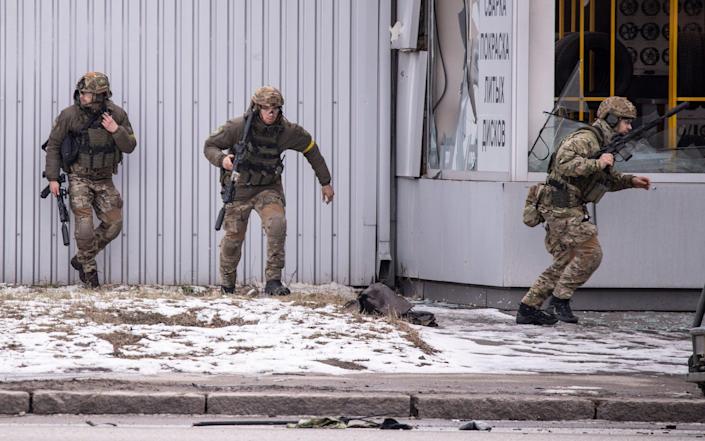
Vladimir Putin put Russia’s nuclear arsenal on standby on Sunday amid growing fears he could deploy weapons of mass destruction to avoid the humiliation of defeat in Ukraine.
President Putin blamed the West’s “unfriendly steps” when ordering Russia’s military command to put its nuclear deterrent “into a special mode of combat service”.
After four days of fighting, Russia’s advance has become bogged down and its troops repelled after fierce fighting in the Ukrainian capital, Kyiv, and in Kharkiv, its second city.
Military analysts claimed Russian forces had suffered their “worst day”, while Kharkiv’s governor said his city had been “cleansed of the enemy”.
Russia admitted for the first time on Sunday that it had suffered casualties but insisted Ukraine’s claims of 4,300 soldiers killed was inaccurate.
In an increasingly aggressive Western reaction to the war, the European Union took the unprecedented step of agreeing to supply Ukraine with weapons, while ratcheting up sanctions by banning all Russian airlines from EU airspace, effectively cutting off travel to the West.
In a televised address, broadcast from the Kremlin, Putin said: “I order the defence minister and the chief of the general staff of the Russian armed forces to put the deterrence forces of the Russian army into a special mode of combat service.
“You see that Western countries are not only unfriendly to our country in the economic sphere – I mean illegitimate sanctions.
“Senior officials of leading Nato countries also allow aggressive statements against our country.”
Russian troops were repelled from Kharkiv on Sunday after entering the city just after dawn in the latest blow to Putin’s plan for a rapid victory.
[embedded content]
There were reports of tanks and armoured vehicles running out of fuel and being left abandoned at the roadside and soldiers looting supermarkets to feed themselves after a break in supply lines.
Drone footage posted online showed at least two Russian convoys hit in air strikes as the Kremlin’s forces failed to establish air superiority, critical to any successful invasion.
However, a three-mile long convoy of armoured vehicles, tanks and troops was last night spotted by satellite moving towards Kyiv. The mayor, Vitali Klitschko, said residents could no longer be evacuated.
One of Putin’s closest allies – Ramzan Kadyrov, the Chechen leader – criticised Russian tactics as “too slow”, demanding his feared fighters be let loose to “finish off the Nazis and terrorists”.
Boris Johnson said on Sunday night that Putin’s nuclear threat was a “distraction from what’s really going on in Ukraine” as resistance forces put up more of a fight than the Kremlin was expecting.
One senior source inside the Ministry of Defence ridiculed the Russian president, accusing him of “waving his manhood”, adding: “This is just a man putting on tight trousers.”
But a second senior military source warned of the risks of widening the conflict.
“Putin’s strategy is escalation and hence the announcement on nuclear weapons,” said the source. “The West needs to avoid being too breathless and too optimistic about the outcome of this war. The first round has gone to Ukraine but there are many more.”
With Russia failing to make gains in Ukraine, Liz Truss, the Foreign Secretary, spoke of her fears that Putin could order the use of “the most unsavoury” weapons. She said: “This could well be the beginning of the end for Putin. I fear that he is prepared to use the most unsavoury means in this war.”
She did not rule out his deployment of nuclear, biological or chemical weapons, adding: “I fear this conflict could be very, very bloody. I urge the Russians not to escalate this conflict but we do need to be prepared for Russia to seek to use even worse weapons. I think it would be hugely devastating.”
Ms Truss gave official backing to the call of Ukraine’s president Volodymyr Zelensky for foreign fighters to travel to the country as part of an international resistance force.
[embedded content]
In a glimmer of hope of an early settlement to hostilities, Mr Zelensky announced he had agreed to talks with a Russian delegation on the Ukraine-Belarus border. The Ukrainian leader had earlier rejected an offer of talks in Belarus, saying the Russian ally had been a launchpad for the invasion of his country.
Dmytro Kuleba, Ukraine’s foreign minister, accused Putin of placing the nuclear deterrent on high alert in order to put pressure on Kyiv at the start of the talks but that his government would not be cowed.
The EU’s decision to supply weapons to Ukraine will bolster its government. The EU also announced fresh sanctions against Russia and its “collaborator” Belarus and vowed to ban RT and Sputnik, Russia’s media outlets, from broadcasting.
“For the first time ever, the European Union will finance the purchase and delivery of weapons and other equipment for a country that is under attack. This is a watershed moment,” said Ursula von der Leyen, the president of the European Commission.
Olaf Scholz, the German chancellor, also announced a sea change in Germany’s defence strategy, signalling a €100 billion (£83 billion) increase in military spending, having agreed at the weekend to send surface-to-air missiles and anti-tank weapons to Ukraine.
Oligarchs turned on Putin on Sunday. Mikhail Fridman, co-founder of Alfa-Bank and one of Russia’s wealthiest tycoons, said in a message to staff: “War can never be the answer. This crisis will cost lives and damage two nations.”
The UK has drawn up a “hit list” of oligarchs who will face sanctions, including asset freezes and curbs on the use of private jets, in coming days.
Protests across Russia continued on Sunday with a further 900 people arrested, bringing the total detained to more than 4,000, while huge queues formed at ATMs after the state’s central bank was hit with punishing sanctions.
The United Nations said almost 370,000 refugees had fled Ukraine into bordering countries, risking a humanitarian crisis. Britain relented on Sunday and scrapped visa rules for Ukrainians with family in the UK. Boris Johnson said the UK “will not turn our backs in Ukraine’s hour of need”.
[embedded content]
BP was forced on Sunday to cut its business links with Rosneft, the Kremlin-controlled energy company, in which the UK firm had a 20 per cent stake. Bernard Looney, BP’s chief executive, resigned from Rosneft’s board and the company is expected to take a heavy financial hit on the deal, after its stake was previously valued at £10 billion.



